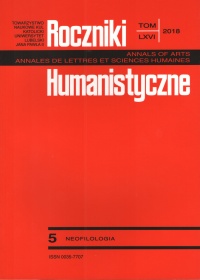The Arriviste: An Emblem of Displacement in French Realist Novel from 1830 to 1895. Sketch
Abstract
An arriviste is a typical example of a ‘child of the nineteenth century.’ The arriviste is a product of social and political developments such as The French revolution, Napoleonic rule and the industrial revolution. The changing climate of the nineteenth century provides new opportunities for young people, stimulating their imagination and awakening their ambitions to conquer the world.
The ‘arriviste’ is a character in movement. The French term ‘arriviste’ first appears in the nineteenth century, and describes a hero who is ‘still arriving’, having not yet accomplished his career ambitions. An ‘arriviste’ is thus different from a parvenu, as he has not yet succeeded. The ‘arriviste’ usually begins his career when he leaves his family home as a young adult. He leaves behind his rural village or town, aiming to find success in the capital. He moves through social classes, shifting from his own modest milieu to socializing with the wealthy upper classes. The ‘arriviste’ is a literary character who unites himself with geographical and social displacement. Furthermore, he is often considered as a displaced hero. In search of a new position, he risks being considered as a usurper, unable to find the right place in the Society.
References
Aziza, Claude, Claude Oliviéri, et Robert Sctrick. Dictionnaire des types et caractères littéraires. Paris : Nathan, 1978.
Bancquart, Marie-Claire. « À travers les quartiers de Paris : Bel-Ami : la conquête et l’illusion de la conquête ». Dans Changer de région, de métier, changer de quartier. Recherches en Région Parisienne, éd. Odile Benoit-Guilbot, 89–93. Nanterre : Recherches pluridisciplinaires de l’Université Paris X-Nanterre, 1982.
Barbéris, Pierre. Balzac. Une mythologie réaliste. Paris : Larousse université, 1971.
Barbéris, Pierre. Le Père Goriot : écriture, structures, significations. Paris : Larousse, 1972.
Bardèche, Maurice. Balzac, romancier : La formation de l’Art du Roman chez Balzac jusqu’à la publication du « Père Goriot » (1820–1835). Genève : Slatkine Reprints, 1967.
Berthier, Philippe (réd.). Stendhal : l’écrivain, la société, le pouvoir. Grenoble : Presses Universitaires de Grenoble, 1984.
Bourguinat, Nicolas, Pellistrandi, Benôit. Le 19e siècle en Europe. Paris : Armand Colin, 2005.
Branthomme, Michel. « L’espace romanesque chez Daudet ». Le Petit Chose 69 (1995) : 22–25.
Dufief, Anne-Simone. Alphonse Daudet romancier. Paris : Honoré Champion éditeur, 1997.
Dufief, Pierre-Jean. « La crise du héros dans les romans de Daudet ». Le Petit Chose 69 (1995) : 26–29.
Favier, Jean. Paris. Deux mille ans d’histoire. Paris : Fayard, 1997.
Fierro, Alfred. Histoire et dictionnaire de Paris. Paris : Robert Laffont, 1996.
Frigerio, Vittorio. « Les deux visages de Gabriel Lambert — le blanchissage de l’infamie de la page aux planches ». Dans Roman-feuilleton et théâtre. L’adaptation du roman-feuilleton au théâtre. Colloque de Cerisy-La-Salle, éd. Florent Montaclair, 79–90. Besançon : Presses du Centre UNESCO de Besançon, 1998.
Giacchetti, Claudine. Maupassant. Espaces du roman. Genève : Librairie Droz, 1993.
Guérin, Michel. La grande dispute. Essai sur l’ambition, Stendhal et le XIXe siècle. Arles : Actes Sud, 2006.
Lukács, György. Balzac et le réalisme français. Paris : La Découverte, 1999.
Marceau, Félicien. Les personnages de la Comédie humaine. Paris : Gallimard, 1977.
Marcoin, Francis. Lectures d’une œuvre. Les romans de Maupassant. Six voyages dans le bleu. Paris : Éditions du Temps, 1999.
Meynard, Cécile. Stendhal et la province. Paris : Honoré Champion éditeur, 2005.
Mousnier, Roland. La Stratification sociale à Paris aux XVIIe et XVIIIe siècles. Paris : Éditions A. Pedone, 1976.
Riese, Laure. Les Salons littéraires parisiens du Second Empire à nos jours. Toulouse : Privat, 1962.
Saint-Paulien. Napoléon Balzac et l’Empire de la Comédie humaine. Paris : Albin Michel, 1979.
Tulard, Jean. Napoléon ou le mythe du sauveur. Paris : Fayard, 1987.
Copyright (c) 2018 Roczniki Humanistyczne

This work is licensed under a Creative Commons Attribution-NonCommercial-NoDerivatives 4.0 International License.





